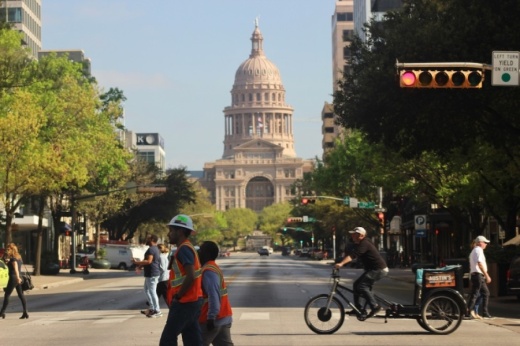Legislative bills are still being drafted, but even in the session's very beginning, a handful of proposals have drawn the attention of local officials as potential pressure points in the expected debates over local control.
As expected, some of the bills target Austin’s decision to cut millions from its police budget and vow to “reimagine public safety.” Although there has been no official proposal attached to it, Texas Gov. Greg Abbott has discussed the possibility of the state taking over at least part of the Austin Police Department.
Legislators have also zeroed in on mayoral and county judge orders that forced businesses to shut down during the pandemic; the practice of cities and counties hiring lobbyists with public dollars to influence legislators; and publicly owned utilities that do not offer rate shopping.
One week into the 2021 session, here are some of the bills to watch.
Public safety budget cuts
House Bill 638Proposed by: Rep. Matt Krause, R-Fort Worth
Summary: This bill would prohibit municipalities and counties from passing annual budgets that do not provide each public safety service—defined as fire, EMS and police—with at least the same amount of money provided in the budget for the previous fiscal year. The only way these budgets can be reduced is if the county or municipality decides to not offer the public safety service in the budget.
House Bill 741
Proposed by: Rep. Steve Allison, R-San Antonio
Summary: If a municipality adopts a budget that decreases the money spent on fire, EMS or police by more than 5% from the previous fiscal year, an election is triggered, and voters decide whether the budget passes. The election does not have to be on a typical election date. If voters support the budget, it passes. If they reject it, the municipality has to amend the budget to fund public safety services with at least 95% of the public safety funding from the previous fiscal year.
Forced closures during a pandemic
House Bill 905Proposed by: Rep. Matt Krause, R-Fort Worth
Summary: If the Texas governor issues a disaster declaration that does not require immediate evacuation but directs private business operations to close, they may not earn a salary that year that is higher than the baseline salary set in the Texas Constitution on Jan. 1, 1953; this number is unclear. If the presiding officer over a municipality or county issues a disaster declaration that orders private business operations to shut down, the salary for the presiding officer, such as a mayor or county judge, is withheld for the duration of the order and the amount is subtracted from their annual compensation.
Senate Bill 251
Proposed by: Sen. Angela Paxton, R-McKinney
Summary: This bill would preclude governments from issuing any order that shuts down places of worship.
Hiring lobbyists with public funds
House Bill 749Proposed by: Rep. Mayes Middleton, R-Wallisville
Summary: Cities and counties may not use public dollars to hire lobbyists to influence state legislators in the city’s or county’s interest, nor may they use public funds to pay a nonprofit that typically works with local governments, such as the Texas Municipal League, and hires lobbyists to push legislators in their direction. This bill would allow residents of the city or county to sue the government if they break this rule.
Senate Bill 234
Proposed by: Sen. Bob Hall, R-Edgewood
Summary: This bill has the same language as HB 749.
Requiring municipally owned utilities to offer customer choices
Senate Bill 182Proposed by: Sen. Charles Schwertner, R-Georgetown
Summary: Once every five years, municipally owned utilities across the state, such as Austin Energy, would be examined by the state’s public utilities commission to compare rates to similar utilities. If the commission finds the five-year average rate for a specific utility is at least 10% higher than rates offered by peer utilities, the utility with the higher rates must begin offering what is called "customer choice." Austin Energy does not currently offer customer choice. Its customers are required to pay its standard rate. If Austin Energy were to offer customer choice, customers could choose their price plan from a list of electricity suppliers. Austin Energy would still be the utility that sends power to customers’ homes; however, customers could choose where the electricity comes from. If the commission requires a utility to transition, they must do so within one year. After one year and 90 days, if the utility has not transitioned to customer choice, the commission can assume oversight authority over the utility until the transition is complete.





